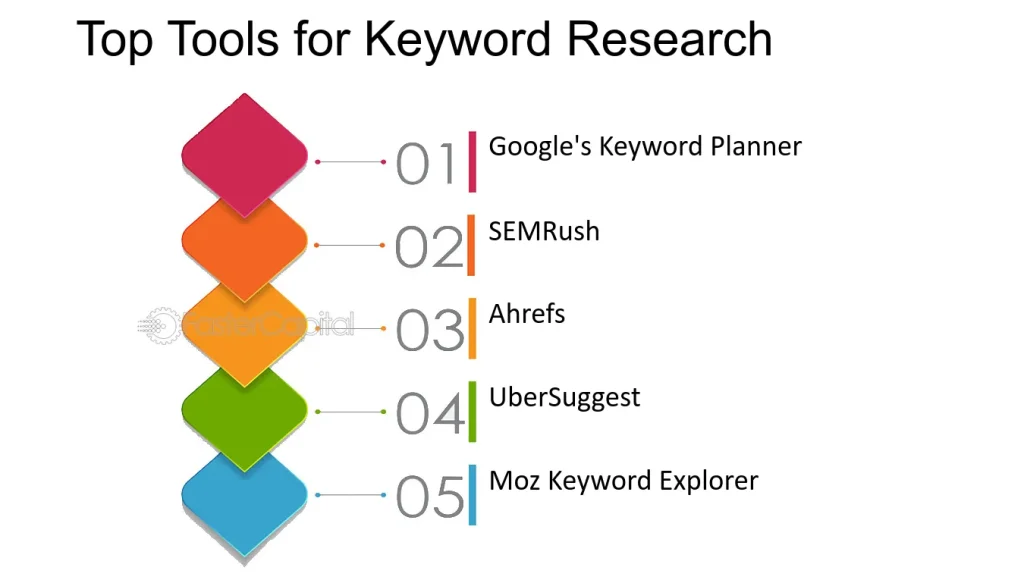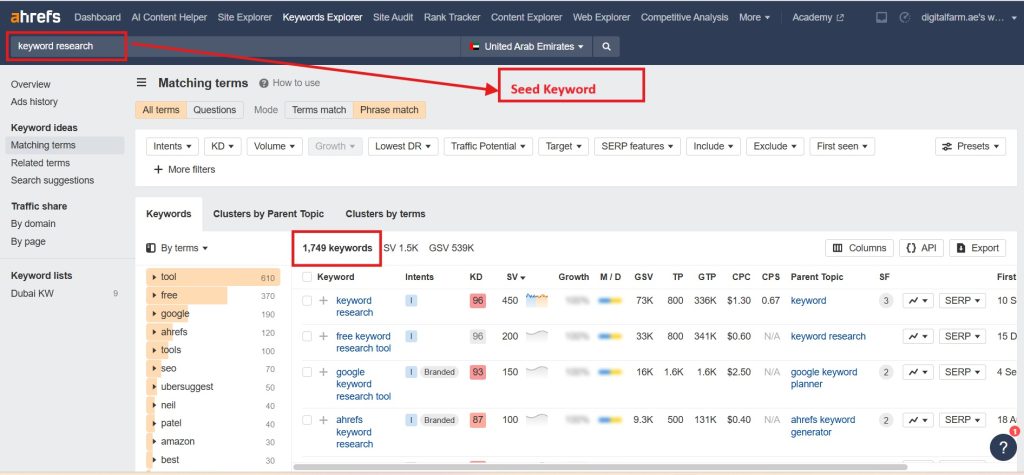How to Do Keyword Research for UAE Business

Keyword research is the foundation of any successful SEO strategy. It doesn’t matter if you’re a small business owner, marketer, or content creator. You need to know how to do keyword research. It can really boost your online presence, along with organic traffic, and increase conversions. As a top digital marketing agency in the UAE, we understand that keyword research is crucial for figuring out what your audience is searching for. It actually ensures your content and marketing strategies are always above the benchmark.
Effective keyword research can make all the difference, from improving your SEO rankings to crafting relatable content. In this blog, you can read about conducting effective keyword research for the sucess of your business.
Why Keyword Research is Crucial for UAE Business
Before we dive into the specific steps, it’s essential to understand the value of keyword research. Keywords are the terms and phrases users type into search engines when looking for information, products, or services. By targeting the right keywords, businesses can:
- Drive targeted traffic:
By using keywords that match what your customers are looking for, your site becomes more discoverable to the right audience. - Increase conversions:
When you choose keywords that match what customers want, you attract people who are ready to take action. The action could include buying something, filling out a form, or inquiring for more details. - Enhance content relevance:
Keyword research helps you create content that can be more realatable what your audience are looking for. This is crucial for engagement and building trust with your audience. - Optimize paid ads:
Choosing the right SEO keywords in PPC campaigns can enhance ad targeting, reduce cost-per-click (CPC), and boost ROI.
Doing keyword research isn’t just about picking the most popular search terms. It’s about finding the keywords that are most relevant, achievable, and profitable for your business. In a competitive market, partnering with a professional SEO agency can enhance your keyword strategy and effectively target the right audience. This ensures you’re reaching maximum investment returns.
Essential Concepts of Keyword Research
Keyword research is the key to effective SEO. Here are the core concepts to understand:
Focus Keyword or Keyphrase
A focus keyword is the main word or phrase you want a page to rank for in search engines. It’s identified through keyword research and guides content optimization.
Long-Tail Keywords
Long-tail keywords are more specific, and longer phrases have less competition. Though they have lower search volume, they often attract more targeted traffic and higher conversion rates because users are more specific in their search intent.
Keyword Strategy
Your keyword strategy is about choosing which keywords to focus on and creating content around them, like blog posts, product pages, or videos. The aim is to pick keywords that match your business goals and can attract the right traffic.
Search Intent
Search intent is the goal behind a user’s query—whether they want to learn, buy, or find something. Understanding intent allows you to create content that directly meets users’ needs. This in turn enhances your chances of ranking well.
Mastering search intent enhances keyword research. It also helps create content that boosts traffic and conversions.

Steps for Conducting Effective Keyword Research

Conducting effective keyword research is essential for any successful SEO strategy. Finding the right SEO keywords helps you optimize your content. It also helps you to attract the right traffic, improve search engine rankings, and drive conversions. Here are the key steps to effective keyword research to reach the right audience:
Step 1: Understand Your Business and Audience
There is an important step before you start keyword research. It is to understand your business and audience well. This helps you find keywords that are most relevant and likely to attract the right visitors.
Define Your Business Niche
Start by asking yourself these key questions:
What products or services do you offer?
What makes your business unique in the marketplace?
Who are your competitors?
What problems are you solving for your customers?
Identify Your Target Audience
Your audience plays a pivotal role in shaping your keyword strategy. You need to understand the following:
Demographics: Age, gender, income level, location, etc.
Psychographics: Interests, values, challenges, and pain points.
Online behaviour: Where they spend their time online, how they search for products or services like yours, and what motivates them to convert.
Once you have a clear picture of your audience, you’ll be in a much stronger position to identify the types of keywords that will resonate with them.
Step 2: Brainstorm Seed Keywords
Seed keywords are the foundation of your keyword research. These are broad terms or phrases directly related to your business, services, or products. It could be the words your potential customers may be searching for. For example:
- If you run a digital marketing agency, your seed keywords might include “digital marketing services”, “SEO” or “social media marketing”.
- If you provide SEO agency services in the UAE, your seed keywords might include “SEO services UAE”, “SEO agency in UAE”, “SEO experts UAE”, or “SEO consultancy”.
Techniques for Brainstorming Seed Keywords
- Think like your customer: What terms would your target audience use to find your business? Focus on the problems your products or services solve and the solutions you provide.
- Analyse your product/service pages:
Review the content on your website and identify the most important terms that represent your offerings.
- Look at industry-related terms:
Consider the common industry terminology, slang, and abbreviations that people might search for.
- Competitor research: See what keywords your competitors are targeting. You can analyse their websites to find gaps in their keyword strategies that you can capitalise on.
Step 3: Use Keyword Research Tools
Now that you have your list of seed keywords, it’s time to expand your list and gather insights using keyword research tools. You can find variations, discover new keywords, and understand key metrics like search volume, competition level, and keyword difficulty with the help of these tools. Some of the best tools that we love to use for keyword research are:
1. Google Keyword Planner
Google Keyword Planner is free to use and provides valuable data on search volume, keyword competition, and suggested keywords. This tool is not only helpful for SEO experts, but they’re also useful for businesses with organic SEO.
2. Ahrefs
Ahref is a very powerful SEO tool that gives you keyword suggestions. Along with the suggestions, it also checks search volumes and also gives an idea on the difficulty level of ranking of certain keywords. It also shows you which keywords your competitors are doing well with, giving you crucial insights.

3. SEMrush
SEMrush is another popular tool that offers comprehensive keyword research features. It provides data on organic search, paid search, and competitive analysis, making it ideal for both SEO and paid media campaigns.
4. Moz Keyword Explorer
This tool helps you choose the best keywords for your website. It offers keyword suggestions along with search volume data, keyword difficulty, and an opportunity score for your website to rank higher.
5. Ubersuggest
Ubersuggest is a budget-friendly tool to identify the the best keywords. It also analyses competetion and track SEO performance. It’s a perfect tool for small businesses looking to get started with keyword research.
By leveraging these tools, you can uncover thousands of keyword variations that might be valuable for your business.
Step 4: Competitor Analysis- A Key to SEO Success
Competitor analysis is a crucial step in any keyword research strategy. By analysing the keywords your competitors are ranking for, you can unlock important insights that can shape your SEO strategy. Competitor analysis is not just about identifying your competitor and their activities, its also about discovering opportunities to outperform them.
Why Competitor Analysis Matters
Competitor analysis allows you to gain a competitive edge by seeing which keywords are driving traffic to your competitors’ sites. These keywords can reveal gaps in your own strategy, giving you a chance to target high-performing terms that you might have missed. It’s also an opportunity to assess keyword difficulty and find less competitive keywords that could offer quick wins.
How to Conduct Competitor Analysis for Keyword Research
-
-
- Identify Your Competitors:
Start by identifying who your top competitors are—both direct and indirect. These are the websites that rank for the same or similar keywords you’re targeting. - Use SEO Tools:
Tools like Ahrefs, SEMrush, or Moz can help you analyse competitors’ keywords. Simply input a competitor’s domain and these tools will generate a list of keywords they rank for. - Evaluate Keyword Gaps:
Look for keywords that your competitors are ranking for, but you’re not. These “keyword gaps” are opportunities for you to target untapped traffic. - Analyse Keyword Performance:
Assess which keywords bring the most traffic and conversions for your competitors. This will help you focus your efforts on keywords that align with your business goals.
- Identify Your Competitors:
-
Incorporating competitor analysis into your keyword research can significantly improve your SEO strategy. By understanding which keywords work for your competitors, you can uncover opportunities to rank higher, attract more traffic, and, ultimately, drive more conversions.
I am text block. Click edit button to change this text. Lorem ipsum dolor sit amet, consectetur adipiscing elit. Ut elit tellus, luctus nec ullamcorper mattis, pulvinar dapibus leo.
Step 5: Analyse Search Intent
Understanding search intent is crucial for effective keyword research. Not all searches are the same. By understanding whether users are seeking information, services, or products, you can tailor your content to better meet their needs.
There are four primary types of search intent:
-
-
-
- Informational intent:
Informational queries are search terms that users enter when they are looking for information. These queries often start with words like “how,” “what,” “why,” or “where.” Users with informational queries typically seek knowledge or answers to specific questions rather than looking to buy something or find a particular website. The user is looking for information, such as “how to conduct keyword research” or “SEO tips for beginners”.
- Informational intent:
-
-

-
-
-
-
- Navigational intent:
Navigational intent refers to search queries where the user wants to find a specific website or web page. These queries typically involve brand names or specific website addresses. The user already knows what they’re looking for and is using the search engine to navigate to that specific site. The user is looking for a specific website or page, e.g., “Facebook login” or “Amazon homepage”. - Transactional intent:
Transactional intent refers to search queries where the user is looking to complete a transaction, such as making a purchase or signing up for a service. These queries often include words like “buy,” “order,” “purchase,” or “subscribe.” Users with transactional intent are ready to take action and are often further down the sales funnel. The user is ready to make a purchase or take a specific action, such as “buy SEO services” or “hire an SEO agency in Dubai”. - Commercial investigation:
Commercial investigation refers to search queries where the user is looking to make a purchase decision but is still in the research phase. These queries often include words like “best,” “top,” “reviews,” or “comparison.” Users with commercial investigation intent are comparing products or services and seeking more information before making a final decision. The user is comparing options before making a purchasing decision, e.g., “best SEO agency in Dubai” or “compare SEO services”.
- Navigational intent:
-
-
-
To ensure your content addresses the correct intent, ensure that the keywords you select match the user’s goals. For example, if a user is searching for “SEO services in Dubai”, you should have a service page dedicated to this specific offering.
Step 6: Focus on Long-Tail Keywords
Long-tail keywords are longer, more specific phrases that tend to have lower search volume but often result in higher conversion rates. These keywords are less competitive and allow you to focus on a niche audience with clear intent.
For example, instead of targeting a broad term like “SEO”, you might go for something more specific like “affordable SEO services for small businesses in Dubai” or “best SEO agency in Dubai for eCommerce websites”.
Why should you focus on long-tail keywords?
-
-
-
-
- Less competition:
Long-tail keywords are more specific and often less competitive, making it easier to rank higher in search results. - Higher conversion rates:
Long-tail keywords attract users with clearer intent who are closer to making a purchase or taking action. - Better content targeting:
Long-tail keywords allow you to create content that directly addresses the needs of your audience, improving user engagement.
- Less competition:
-
-
-
Step 7: Keyword Mapping in SEO Strategy
Once you’ve compiled a list of target keywords, it’s time to map them to the relevant pages on your website. Keyword mapping in SEO strategy ensures that each page targets ensures each page focuses on a distinct set of keywords, preventing keyword cannibalisation. This way, multiple pages won’t compete for the same keywords, allowing for more effective targeting and improved search engine rankings.
How to Map Keywords:
-
-
-
-
- Group similar keywords:
Organize your keywords into categories based on relevance, intent, and search volume. - Assign to pages:
Map specific keywords to the corresponding pages on your site. For example, your homepage could target broad keywords like “SEO services Dubai,” while a dedicated service page could target long-tail keywords like “affordable SEO services for small businesses in Dubai.” - Consider keyword variations:
Ensure you include relevant variations of the target keywords across different pages. For example, one page might target “SEO agency Dubai”, while another could target “SEO experts Dubai”. - Create unique content:
Ensure that each page offers unique and valuable content relevant to the assigned keywords.
- Group similar keywords:
-
-
-
By mapping keywords to specific pages, you ensure that search engines can properly index your content and rank it for the correct queries.
Step 8: Monitor and Refine Your Keyword Strategy
Keyword research doesn’t stop once you’ve implemented your strategy. It’s crucial to continuously monitor and refine your keyword performance over time. Analytics tools like Google Analytics and Google Search Console can be used to track keyword rankings, traffic, and user behaviour.
If some keywords aren’t working as well as you hoped, try tweaking your content, testing out new variations, or optimizing your on-page SEO to boost rankings. Regularly updating your keyword strategy will help keep your business ahead of the competition.
Conclusion: The Power of Effective Keyword Research
Effective keyword research is a vital component of any successful digital marketing strategy. It’s essential to know what your audience wants, fine-tune your content strategy, and drive the right traffic to your website. By choosing the right keywords, using effective tools, and monitoring your performance, you can build an SEO strategy that enhances your online presence and boosts conversions. Remember, keyword research is ongoing. SEO trends and search behaviours change, so revisit your keyword strategy regularly to stay competitive.
Need help with your keyword strategy? As your trusted digital marketing agency, we have the latest SEO strategies to boost your business. Let’s get started today!

